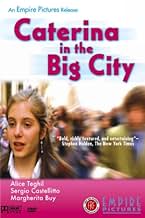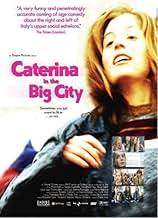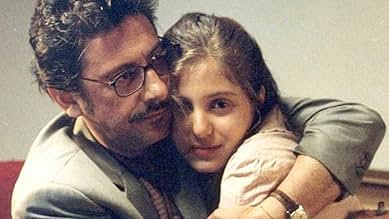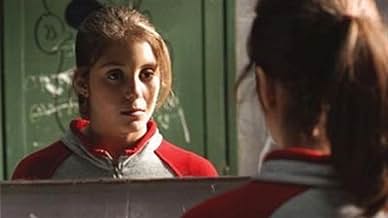AVALIAÇÃO DA IMDb
6,8/10
3,3 mil
SUA AVALIAÇÃO
Adicionar um enredo no seu idiomaCaterina, forced to leave her small town at the age of thirteen, faces the complications of living in the big metropoly of Rome.Caterina, forced to leave her small town at the age of thirteen, faces the complications of living in the big metropoly of Rome.Caterina, forced to leave her small town at the age of thirteen, faces the complications of living in the big metropoly of Rome.
- Direção
- Roteiristas
- Artistas
- Prêmios
- 7 vitórias e 9 indicações no total
Zach Wallen
- Edward
- (as Zach -James Smith- Wallen)
Margerita Mazzola
- Martina
- (as Margherita Mazzola)
Martina Tasquetta
- Alessia
- (as Martina Taschetta)
Giulia Gorietti
- Giada
- (as Giulia Elettra Gorietti)
- Direção
- Roteiristas
- Elenco e equipe completos
- Produção, bilheteria e muito mais no IMDbPro
Avaliações em destaque
"Caterina va in città" seems like your typical teen film. It somehow reminds me of "Thirteen", but it goes a little deeper than the average American teen film.
In American teen films the parents are normally reduced to simple shadows that serve more as a background for their sons and daughters' lives - they are either of the preaching-repressive sort, or the tolerant, ever-forgiving parents, that eventually through love will help their children to the way of redemption.
Not so, "Caterina va in città". In this film, not just Caterina ( Alice Teghil) but her parents as well are portrayed as three-dimensional human beings and this makes the film more interesting.
Caterina and her parents move from a small Italian town to Rome. And there Caterina's life will be shaken. She goes to high school and meets new friends - many new things happen in her life. She feels uprooted from her old self, and doesn't know anymore who she really is.
One can say that "Caterina va in città" is a coming of age film - it portrays her search for her place in the world - many American teen films tell the same story. But what differentiates this film from its American counterparts is the attention it gives to the parents. The father Giancarlo (Sergio Castellito) is a deeply disturbed personality. He thinks the world revolves around him and there's a conspiracy of important segments of society whose main aim is preventing him from succeeding in life. He is an egoist that treats his wife as a dumb servant and his daughter as a beautiful puppy. But no, he's not a "bad" man - in his own distorted way he loves his wife and his daughter. Sergio Castellito gives us a stellar interpretation as the problematic father, underlining his pathetic and quixotic traits. Agata (Margherita Buy), is his ever-enduring wife - she has a deeper layer than it may appear at first glance. And there's Caterina living with them, seeing them with her innocent eyes.
The other characters in the film are what one could call walking clichés. Nothing that has not been shown before in American teen movies. Politics shows its colors in the film, but in a very superficial way. It's not really essential for the film's story - left and right could have been easily substituted for rival football teams.
The ending (difficult to imagine in American films) will come as a surprise and have a liberating effect on the viewer. All in all, "Caterina va in città" is a good teen film thats stands a bit above the usual film of the genre.
In American teen films the parents are normally reduced to simple shadows that serve more as a background for their sons and daughters' lives - they are either of the preaching-repressive sort, or the tolerant, ever-forgiving parents, that eventually through love will help their children to the way of redemption.
Not so, "Caterina va in città". In this film, not just Caterina ( Alice Teghil) but her parents as well are portrayed as three-dimensional human beings and this makes the film more interesting.
Caterina and her parents move from a small Italian town to Rome. And there Caterina's life will be shaken. She goes to high school and meets new friends - many new things happen in her life. She feels uprooted from her old self, and doesn't know anymore who she really is.
One can say that "Caterina va in città" is a coming of age film - it portrays her search for her place in the world - many American teen films tell the same story. But what differentiates this film from its American counterparts is the attention it gives to the parents. The father Giancarlo (Sergio Castellito) is a deeply disturbed personality. He thinks the world revolves around him and there's a conspiracy of important segments of society whose main aim is preventing him from succeeding in life. He is an egoist that treats his wife as a dumb servant and his daughter as a beautiful puppy. But no, he's not a "bad" man - in his own distorted way he loves his wife and his daughter. Sergio Castellito gives us a stellar interpretation as the problematic father, underlining his pathetic and quixotic traits. Agata (Margherita Buy), is his ever-enduring wife - she has a deeper layer than it may appear at first glance. And there's Caterina living with them, seeing them with her innocent eyes.
The other characters in the film are what one could call walking clichés. Nothing that has not been shown before in American teen movies. Politics shows its colors in the film, but in a very superficial way. It's not really essential for the film's story - left and right could have been easily substituted for rival football teams.
The ending (difficult to imagine in American films) will come as a surprise and have a liberating effect on the viewer. All in all, "Caterina va in città" is a good teen film thats stands a bit above the usual film of the genre.
I wish I could say that this was a great film because there really were a lot of things that one could like about it.
As it turns out, however, it is a good, but flawed film. I will give this film a recommendation, I think it is worth seeing.
The film made a number of incredible social statements. It really cuts to the quick about the nature of society, the people who can manipulate the system on both sides are in collusion with each other to keep their privilege. The people who are on the outside find themselves on the outside, looking in. They can be taken under someone's wing but they are never really more then a pet, the Jimmy Olsen to someone's Superman.
The film had spectacular acting, particularly from the lead.
So what then keeps the film from being great? One of the biggest problems comes from the episodic and picaresque structure of the film. It has the kind of structure that is more interesting because of its discontinuity then because of its continuity. And while it makes for a lot of interesting discussions, this could turn a lot of people off, probably even more then the subtitles.
Honestly, the problem is that it begins with Caterina being pulled in many directions and it allows us to see facets of her through these different social lenses. The trouble is that we never get a baseline reading on her in the beginning before she moves to Rome. This is done very well but we never get the impression of her as anything more then a tablet that the ideologies of others are being written on, even at the end of the film when she supposedly finds herself. I won't give a spoiler as to how but the ending that someone else commented was her in her element is really just another case of this.
You know what, I've changed my mind. This is a wonderful film to watch. Its a spectacular way to look at what life is really like when you are outside the powerful and privileged circles of society and you can only be influenced by the ideologies of others but you really lack any voice of your own.
Watch this along with Welcome to the Dollhouse and see what life was like for the rest of us. Let this film show you the social cliques, collusion and ideology and let Solondz show you the sheer cruelty of a society that, as J. G. Ballard said, normalized psychopathy. And see it for what it really is, not some sugarcoated network television version (I think you guys know what very popular television series I'm talking about).
As it turns out, however, it is a good, but flawed film. I will give this film a recommendation, I think it is worth seeing.
The film made a number of incredible social statements. It really cuts to the quick about the nature of society, the people who can manipulate the system on both sides are in collusion with each other to keep their privilege. The people who are on the outside find themselves on the outside, looking in. They can be taken under someone's wing but they are never really more then a pet, the Jimmy Olsen to someone's Superman.
The film had spectacular acting, particularly from the lead.
So what then keeps the film from being great? One of the biggest problems comes from the episodic and picaresque structure of the film. It has the kind of structure that is more interesting because of its discontinuity then because of its continuity. And while it makes for a lot of interesting discussions, this could turn a lot of people off, probably even more then the subtitles.
Honestly, the problem is that it begins with Caterina being pulled in many directions and it allows us to see facets of her through these different social lenses. The trouble is that we never get a baseline reading on her in the beginning before she moves to Rome. This is done very well but we never get the impression of her as anything more then a tablet that the ideologies of others are being written on, even at the end of the film when she supposedly finds herself. I won't give a spoiler as to how but the ending that someone else commented was her in her element is really just another case of this.
You know what, I've changed my mind. This is a wonderful film to watch. Its a spectacular way to look at what life is really like when you are outside the powerful and privileged circles of society and you can only be influenced by the ideologies of others but you really lack any voice of your own.
Watch this along with Welcome to the Dollhouse and see what life was like for the rest of us. Let this film show you the social cliques, collusion and ideology and let Solondz show you the sheer cruelty of a society that, as J. G. Ballard said, normalized psychopathy. And see it for what it really is, not some sugarcoated network television version (I think you guys know what very popular television series I'm talking about).
I am a student in Australia, in year 9, 15 years old, studying Italian at LaSalle Catholic College Bankstown. I viewed this film as an excursion 3 days ago, and I loved it. I feel for Caterina because I guess I am a little naive in a way. She didn't realize that people were using her, she didn't realize that Margherita liked her in a different, more romantic way, she didn't know about a lot that went on in Rome. It was a very nice, dramatic and funny storyline, and i suppose it appeals to a large audience. I rated it 9/10. I took off 1 mark because I feel not enough was shown of Edward, the guy she loved, the guy from "down under", the guy who most Australians can identify with. He played a prime role in my eyes because he brought her life back on track when she had run away. A little more could have also been shown of Fabietto and Agata's relationship. This film was an excellent representation of the comparison between the posh side of Italy and the grateful and appreciative side of Italy
Caterina gives us an opportunity to feel and a chance to hope. A young girl both naive and somehow mature, she is unsure of what she wants in life. Her task is learning to navigate the waters of a high school in Rome where she is the new girl from the sticks when her father is transfered from a small town on the coast. He fulfills his dream of returning to the cultural mecca of the capital where he hopes to take his "rightful" place among the intelligentsia. But the film turns on just this point"rightful place". There are no simple answers, though we do have an opportunity to see how complex it is to find one's place, rightful or not, in the world. Caterina is something of a metaphor for the Italian populace at large, I would think. But she is more than this. There is something about her story that touched me, several decades and half a world away from the world she inhabits, a world stratified by cliques and patronage, prejudice and injustice...a world very much like the one I live in and the one I imagine most of us live in. Caterinaas the film that bears her namedoes not take the easy way out in running away or self-repression or living a life of quiet desperation, even when her sheltered provincial upbringing and less-than-ideal family situation do not give her any clues on how to deal with her new life and classmates from prominent families. She tries to adjust to the fast-pace and superficiality of life in the Italian capital, and much of the fun of the movie is seeing her in the various situations she encounters along the way. Her father is great as the frustrated writer with no talent and a loud voice, a self-important boor. My heart goes out to all the Caterinas of the world, who go forward with optimism and pure heart even when they know the odds are against them.
I saw 'Caterina va in Città' in Sydney, where the audience had mixed reactions to the schoolboy who speaks Italian with what's apparently meant to be a Sydneysider accent. In general, I was impressed by the ensemble acting, but I felt that the best performance was given by Margherita Buy as the heroine's mother Agata. I was disappointed that Agata has so little to do with the main plot of the film.
The symbolism is just a trifle heavy-handed in this movie. Remember those Hollywood war movies from World War Two, in which the bomber crew conveniently had one member of every (white) ethnic group? (And there was usually one rich guy and one guy from the slums.) Well, director/co-scriptwriter Paolo Virzi has got that gimmick here, Italian style. When 15-year-old Caterina's parents move house from a Tuscan seaside town to Rome and enrol her in a big-city school, the student body conveniently includes the full spectrum of Italy's national archetypes. For example, Daniela is wealthy, beautiful and popular, the daughter of an official in the right-wing government. Margherita is a left-wing 'revolutionary', the daughter of a famous intellectual. Of course, the film implies that Margherita is somehow better and more 'authentic' than Daniela.
Because I found the political subplots of this movie to be deeply clichéd -- especially since Italy is in no position to lecture any other nation on the subject of politics -- I was pleased that the film's political content stays firmly secondary. The main story of this movie is, rightly, Caterina's uneasy and awkward progress through adolescence and into adulthood. It's no surprise to discover that being a teenage girl in modern Italy is difficult, but surely every adolescent -- male, female, rich, poor, in any century or culture -- has found adolescence to be a difficult time of transition. Except for some of its political comments, I found this to be a very honest and intelligent film, with characters I really cared about. I'll rate 'Caterina va in Città' 8 out of 10, and I look forward to more films from Paolo Virzi. Brava, Caterina!
The symbolism is just a trifle heavy-handed in this movie. Remember those Hollywood war movies from World War Two, in which the bomber crew conveniently had one member of every (white) ethnic group? (And there was usually one rich guy and one guy from the slums.) Well, director/co-scriptwriter Paolo Virzi has got that gimmick here, Italian style. When 15-year-old Caterina's parents move house from a Tuscan seaside town to Rome and enrol her in a big-city school, the student body conveniently includes the full spectrum of Italy's national archetypes. For example, Daniela is wealthy, beautiful and popular, the daughter of an official in the right-wing government. Margherita is a left-wing 'revolutionary', the daughter of a famous intellectual. Of course, the film implies that Margherita is somehow better and more 'authentic' than Daniela.
Because I found the political subplots of this movie to be deeply clichéd -- especially since Italy is in no position to lecture any other nation on the subject of politics -- I was pleased that the film's political content stays firmly secondary. The main story of this movie is, rightly, Caterina's uneasy and awkward progress through adolescence and into adulthood. It's no surprise to discover that being a teenage girl in modern Italy is difficult, but surely every adolescent -- male, female, rich, poor, in any century or culture -- has found adolescence to be a difficult time of transition. Except for some of its political comments, I found this to be a very honest and intelligent film, with characters I really cared about. I'll rate 'Caterina va in Città' 8 out of 10, and I look forward to more films from Paolo Virzi. Brava, Caterina!
Você sabia?
- CuriosidadesSara Pallini's debut.
- Erros de gravaçãoThe story begins in 2003, but the dates do not match up with the days of the week for that year.
- ConexõesReferences Os Irmãos Cara de Pau (1980)
- Trilhas sonorasInno ufficiale dei giovani fascisti
Music by Giuseppe Blanc and lyrics by Vittorio E. Bravetta
Sung at the wedding reception
Principais escolhas
Faça login para avaliar e ver a lista de recomendações personalizadas
- How long is Caterina in the Big City?Fornecido pela Alexa
Detalhes
Bilheteria
- Faturamento bruto nos EUA e Canadá
- US$ 296.464
- Fim de semana de estreia nos EUA e Canadá
- US$ 9.352
- 5 de jun. de 2005
- Faturamento bruto mundial
- US$ 4.407.426
- Tempo de duração
- 1 h 47 min(107 min)
- Cor
- Mixagem de som
- Proporção
- 2.35 : 1
Contribua para esta página
Sugerir uma alteração ou adicionar conteúdo ausente










